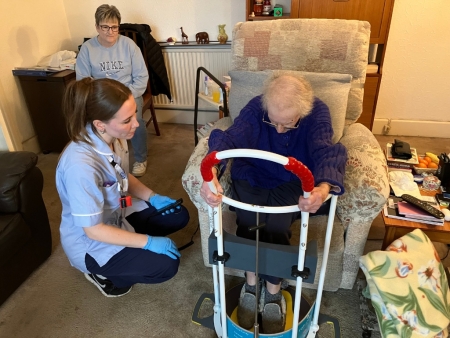Work experience takes place in the workplace and allows individuals to experience what it’s like to undertake a job supervised by staff who already work in the environment.

Work experience can vary from a half a day taster session through to programmes over one or two weeks. Some work experience placements offer a hands-on experience, while some provide insights, observation, and work shadowing. All work experience placements can deliver a valuable experience for people looking to find a career in the health sector and in developing employability skills.
Why do Work Experience with Us
Work experience is crucial to bridge the gap between education and the world of work. Work experience can open people’s eyes to jobs they had never thought of, inform and guide career options and pathways and offers people a chance to prove themselves to an employer. Work experience can help instil the attitudes and behaviours expected in a work environment. If we want people who are ready to work in healthcare, we need to be ready to help build their employability skills.
Working in healthcare is an extremely rewarding career and offers an experience like nowhere else. Every role, whether it is clinical or non-clinical plays a vital role in making a difference to patients, service users and families and carers. You will learn a lot about yourself as well as developing professionally.
Who is Work Experience For?

In the interests of widening participation and equality of opportunity, only one placement application per applicant at a time. Only one placement per person per school year will be accepted (1 September – 31 August) due to the demand for placements.
We will accept and prioritise applications from those living in Nottingham.
When Will I know If I Have a Place?
This webpage is a ‘live’ facility which is constantly being updated to reflect the current status of all the placement opportunities available. Please note that the application process normally takes 8 weeks but, during periods of peak demand and after the launch of additional healthcare settings, this may be considerably longer. Please allow sufficient time for your application to be processed. You will be updated via email during the application process, and we recommend that you check your spam folder periodically for responses as emails may be sent here by mistake. All applications are registered and processed, as quickly as possible, on a chronological basis, taking into consideration date of receipt and requested placement date.
Apply for Work Experience placements here
PLEASE READ BEFORE APPLYING:
In the interests of widening participation and equality of opportunity we will only process one placement application per applicant at a time. Should your request be declined, you are eligible to reapply at a later date or apply for a different placement immediately. Also, please note that if you are successful, we can only co-ordinate one placement per person per school year (1 September – 31 August) due to the demand for placements.
The duration of the work experience placements offered through our service are normally structured around a one week experience. Other departments feel it is sufficient to offer either 1 or 2 days only. The placement duration is predetermined by the departments and is non-negotiable. Placement requests for alternative configuration/duration placements e.g. weekly slots, weekends, long-term placements, work placements as part of a health & social care course, or university elective placements cannot be accommodated. Bank Holidays are a particularly busy time for NHS staff and if a Bank Holiday falls within your allocated placement, you should not attend on that day.
Please note that you can only apply for one placement at a time. Please select a placement which is aligned with your chosen career pathway, since some of the clinicians choose to restrict their work experience placements to those students who are able to evidence a specific interest or intent towards their given professionalism, together with the academic ability. Please ensure that you have attained the specified age criteria as these are strictly enforced and non-negotiable.
For more information on work experience placements contact: ncp.workexperience@nhs.net

What is on offer
Some examples of work experience placements available at Nottingham CityCare Partnership:
- Learning and Education
- Operations
- The Community Neurology Team
- The Community Stroke Team
- Speech and Language Therapy
- Community Rehabilitation and Falls Service
Read our Case Studies:
Further Resources and Information
It takes all sorts of people to become doctors… The sort of people like you. Doctor You has been set up by Health Education England to encourage more people to consider a career in medicine.
Watch and learn about different Allied Health Professional careers created to show a typical day. You can look around the environment, and watch short films embedded within it.
Useful links to support your career journey:
Explore roles | Health Careers
Think Care Careers (skillsforcare.org.uk)
Step into the NHS | help young people discover NHS careers
The King's Trust | Confidence, courses, careers
Search apprenticeship – Find an apprenticeship – GOV.UK



